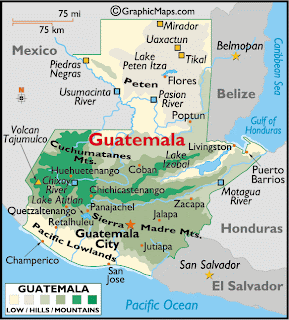As Guatemalans
doubt the efficacy of the government's state of siege in Alta Verapaz and worry about a potential escalation of the
conflict to malls, schools, and police stations, today they are also remembering the end to their last war.
Today, December 29, 2010 marks the fourteenth anniversary of the historic
Firm and Lasting Agreement that officially ended the country's thirty-six year conflict / civil war. The accords were signed by Alvaro Arzu of the National Advancement Party (PAN) and the high command of the Guatemalan National Revolutionary Unit (URNG).
Here's is what I concluded in a chapter (Opportunity lost: The Guatemalan National Revolutionary Unit) that I prepared for an edited volume entitled
Conflict Transformation and Peacebuilding: Moving From Violence to Sustainable Peace (2009). "While there has not been a return to political violence by any of the warring parties, the goals of the peace process have not entirely been fulfilled. The peace process called for more than simply an end to the war. The URNG, the government, civil society and the international community spent ten years designing a lasting agreement that some hoped would radically transform Guatemala’s political, social, and economic systems. At best, progress on these goals has been mixed.
No doubt, the peace process contributed to the further democratization of Guatemala, a process that had begun ten years earlier. The period of the peace process witnessed the successful mobilization of historically marginalized groups. Since then, however, these groups have lost much of their ability to influence the country’s political structures (García 2004). The URNG also has competed in three elections (1999, 2003, and 2007) since its reinsertion into the formal political system. However, after finishing a distant third in 1999, it is now on the verge of irrelevancy as it only captured 3 percent of the vote in the most recent election and former combatants occupy positions in no less than three other political parties.
One of the primary factors that contributed to the outbreak of war in the first place was the country’s dire economic situation. Today, Guatemala remains one of the poorest countries in the region. According to the World Bank, 56 percent of the population lived in poverty in 2006. As of 2004, 80 percent of those living in the countryside and 76 percent of the indigenous people lived in poverty. As part of the peace accords, the government promised to significantly increase tax revenues and health and education expenditures. While these commitments were less than many had hoped for, the government has not even attained these modest goals.
Finally, the parties reached agreements on human rights that led to investigations by the UN (and the Catholic Church) into wartime abuses. These reports remain a critical contribution to the historical record. However, the investigations failed to hold anyone accountable for crimes committed during the war. This impunity most likely has contributed to today’s crisis where violence has reached wartime levels. If one takes the number of deaths attributed during the 36 year war, an estimated 4,167 to 6,944 people were killed each year. Today, roughly 5,000 Guatemalans are murdered yearly. This makes Guatemala one of the most dangerous countries in the Western Hemisphere. While much of the violence is related to organized crime, drug trafficking, street crime, and violence against women, the victims also frequently include human rights workers, labor leaders, judges and lawyers. The failure to resolve any of the historical structures that led to the war, except perhaps political exclusion, is one of the greatest failures of the peace process.
Why have the results of the peace agreement been so disappointing? First, the two parties that signed the final agreements were relatively weak. The URNG demobilized roughly 500 combatants and had much less popular support than years earlier. Alvaro Arzú’s governing PAN party had a relatively minor presence in the congress. The ASC, while it had an advisory role in the peace process, did not have a definitive say in any agreements. Several agreements were signed without its support which led to some animosity, especially with the URNG. The weakness of these three actors was critically important as several agreements required constitutional amendments, Congressional approval, and support from a national referendum. Sadly enough, some complain that the organized group most vocal in its support for approving the reforms was the international community which had staked a great deal of its reputation and resources on the peace process.
What lessons can one take from the example of the URNG? First, it is critical to understand the ratification process of any agreements signed. As ORPA commander Rodrigo Asturias told me, it is a mistake to count on the government and other political actors to expend political capital to push through reforms without outside pressure. Second, the guerrilla group needs to focus greater attention upon the process through which it can transform itself into a competitive political party in the postwar period. This is necessary so that it has the clout to pressure for the implementation of the agreements. While the URNG did receive some educational scholarships and reinsertion stipends for former combatants, it woefully neglected the building of a vehicle to carry out its political program once the accords were signed. As a result, those who struggled with the URNG for over three decades continue to suffer the consequences."




